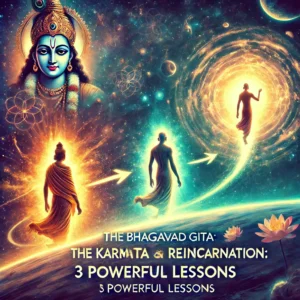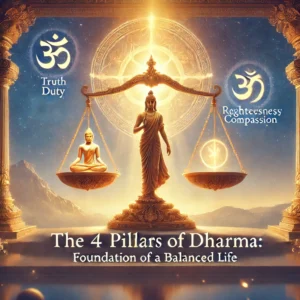5 Powerful Ways to Balance Dharma and Free Will – Bhagavad Gita Wisdom
Dharma and Free Will: Understanding the Balance Between Duty and Choice
Introduction
Life presents us with choices at every step. Sometimes, we act based on moral responsibility (Dharma), while other times, we follow personal desires (Free Will). But how do we balance these two? The Bhagavad Gita provides profound insights into this dilemma, guiding us on how to align our free will with our higher duty.
1. Understanding Dharma: The Duty of Every Individual
https://dayinspirehub.com/5-powerful-ways-dharma-shapes-a-purposeful-life/
Dharma is not just a religious concept; it is the natural order that upholds the universe. In the Bhagavad Gita, Krishna explains that every person has a duty (Swadharma), which they must fulfill regardless of personal desires.
- Types of Dharma:
- Personal Dharma (Swadharma): Duty based on one’s nature and role in life.
- Universal Dharma (Sanatana Dharma): Moral values that apply to all, like truth, compassion, and non-violence.
- Situational Dharma (Yuga Dharma): Responsibilities change based on time and circumstances.
2. Free Will: The Power of Choice
Unlike animals, humans have the power to make conscious choices. Free will allows us to decide our actions, but with this power comes responsibility. The Bhagavad Gita emphasizes that while we have the right to act, we do not control the results.
- Example from the Mahabharata:
Arjuna had the free will to choose between fighting in the war or escaping his duty. Krishna reminded him that abandoning his Dharma as a warrior would lead to dishonor and imbalance in society.
3. The Conflict Between Dharma and Free Will
The struggle between duty and desire is an age-old human challenge. Some key points to consider:
-
When Free Will Opposes Dharma:
- Acting out of selfish desires rather than fulfilling responsibilities.
- Choosing personal gain over moral righteousness.
- Ignoring responsibilities due to fear or laziness.
-
When Free Will Aligns with Dharma:
- Making choices based on righteousness and truth.
- Performing duties without attachment to results.
- Following the path of selfless service (Karma Yoga).
4. How to Balance Free Will and Dharma?
To achieve harmony between duty and choice, one must:
- Develop Self-Awareness: Understand your role and responsibilities in life.
- Practice Detachment: Perform actions without being obsessed with outcomes.
- Seek Guidance from Scriptures & Wise Mentors: The Bhagavad Gita, Upanishads, and spiritual teachers provide clarity.
- Meditate and Reflect: Regular self-inquiry helps in making righteous decisions.
5. The Path to Spiritual Growth
Balancing Dharma and Free Will is the key to living a righteous and fulfilling life. By making conscious choices aligned with Dharma, we move closer to self-realization and inner peace. The Bhagavad Gita teaches that true freedom is not doing what we want but choosing what is right.
Conclusion
By consciously choosing righteousness over fleeting desires, we cultivate inner peace, clarity, and spiritual progress. Free will should not be used to escape responsibilities but to fulfill them in the best possible way. True freedom is not about doing what we want but about choosing what is right.
When Free Will is guided by Dharma, life becomes meaningful, purposeful, and ultimately, leads to liberation.




